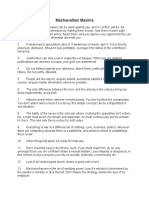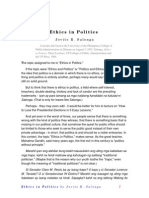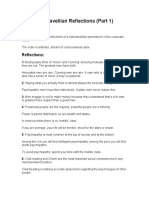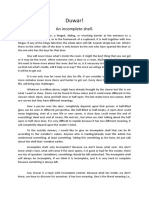Being Ruthless
Being Ruthless
Uploaded by
Disha TCopyright:
Available Formats
Being Ruthless
Being Ruthless
Uploaded by
Disha TOriginal Description:
Copyright
Available Formats
Share this document
Did you find this document useful?
Is this content inappropriate?
Copyright:
Available Formats
Being Ruthless
Being Ruthless
Uploaded by
Disha TCopyright:
Available Formats
being ruthless 6 Traits Of A Ruthless Man There are many ways to get what you want.
You can be Mr. Nice Guy and ask, "please, please, with a cherry on top." You can be a whiner and complain until you get your way. Or, you can be the bad guy and take what you want or stop at nothing to achieve your goals. Basically, be ruthless, my preferred way. Now let's get one thing straight. Being ruthless is not going to make you loved and admired. It won't even get you respect. It will, though, make you focused and, more importantly, feared. That, my friends, isn't necessarily a bad thing. People ask if it's better to be feared or loved, and the answer is always the same: feared. It lasts longer than love. Being ruthless in business accomplishes things. Especially when a guy is behind on his payments. But don't mistake ruthlessness with being a tyrant. Being ruthless means you take no prisoners, you develop a killer instinct, but you are consistent in your fierceness. There's nothing worse than a bad arse who changes his mind every time the wind blows east. That's not being ruthless, it's being a lunatic. So let's look at what you need to do to be ruthless:
1. Leave emotions at the door When you're ruthless, you have to make decisions without feelings. Emotions cloud your judgment. They weaken you when it comes to the people you like. When you decide to be ruthless in business or in your personal life, emotions should go out the window. Don't bend the rules for no one; be consistent in your actions. If you get hired for a job and your first order is to fire half your staff, you have to be cold and calculating. Eliminate the useless employees. You wouldn't keep a guy who doesn't know his arse from his elbow in business but bakes you cookies every Friday, just because you think he's a stand-up guy. This emotional detachment applies to all aspects of business. If your enemy is weak, show no compassion and use the opportunity to destroy him. When you're ruthless and aggressive, you have to make tough decisions. It's going to take brass balls; you don't have time to worry about feelings. Remorse exits your brain forever. You never apologize. You don't have pity. You don't feel sorry for no one. Why should you? It's business, not personal, and if the other guy doesn't understand that, what the hell do you care? If you tolerate idiots or forgive anyone, you might as well just cut off your balls right now, little girl... 2. No tolerance for incompetence Someone who's ruthless wants to be surrounded by people that can execute his vision. A ruthless person needs to be surrounded by intelligent people if he wants to get things done. When you're ruthless, you have no tolerance or patience for stupid people. Get rid of waste immediately. If someone is too stupid to think before they act, they don't deserve respect or dignity -- so get rid of them. You're only as strong as your weakest link, so don't let stronzos get in the way of your ambition. Zero tolerance. Page 1
being ruthless
3. Never forgive Forgiveness makes you weak. Ruthless people don't understand the meaning of forgiveness. You can't ever forgive idiocy, betrayal or disloyalty. Someone screws up, they're gone, fired, out of your life. No excuses, no explanations. Forgiving someone always leaves the door open for others to betray you as well.
4. Punish quickly & brutally Beyond not forgiving someone for treachery or infidelity, you need to make an example of those responsible to ensure that it doesn't happen again. Your reaction to being betrayed has to be consistent, quick, and it has to be heartless enough that it sends a clear message to others: Don't f*ck with me. What's important here is that you punish in a consistent manner. If you like putting guys in cement shoes when they screw you over, do it across the board. Don't make an exception for the cafone you caught sleeping with your wife and give him the "extra treatment." That's letting emotions rule. If you delay your punishment, like the Count of Monte Cristo, you defeat the purpose of punishing someone. If your dog eats the plate of cannoli you've been looking forward to all day, plotting revenge and hitting him out of the blue three weeks later isn't going to send the message, "Don't ever touch my freakin' cannoli again, you stinking mutt." Learn to scare the crap out of people and stick to the plan... 5. Instill fear in others Whether you do it by your actions, by your words, by hiring some muscle, or by carrying a Beretta, instill fear in others. They are more likely to surrender if they fear you. And when you want to take over the world, you want to get there as quickly as possible, and with as little bloodshed as possible. Blood is a big expense. Turn those around you into the French, and they'll surrender like patsies.
6. Stay focused & determined When you aim to be ruthless, you have to stick to it all the way. And if you have a "master plan" to go along with your ruthlessness, make sure you never forget it. If you want to build the largest garbage disposal company in the world, focus on destroying or buying out all those that stand in your way. Don't get distracted by buying a cow farm in Tijuana. make your move That's it, that's all. So go out there and make your mark -- just don't turn into Mussolini. He failed because he failed at two things I mentioned: he let his emotions get the best of him and he lost focus. If you want to be a brutal, egomaniacal dictator that stays in power for a long time, just read my freakin' articles. I'll send you a bill later. Capisce? Watch your backs and keep your noses clean. ***** Page 2
being ruthless Getting ahead is the name of the game in today's workplace. Many see how others get ahead and wonder why certain behavior is rewarded. A practical approach would be to determine exactly what gives this person or that persona a specific edge and emulate that style. It is important, however, when using a certain strategy, to incorporate it into the existing persona as to not appear fake. 1. Know the rules. Many people incorrectly take the bull in a China shop approach to office politics. Going in haphazardly without knowing the lay of the land is wrong. Watch how office hierarchy works. Know the job and seek out people with real knowledge, instead of gossip. 2. Show no emotion. Behavior is being assessed at all times in the workplace. Often, extreme emotions polarize an employee. It is important to be adamant in belief and direction, but neutral in emotion. 3. Work after five and before eight. This serves at least two goals. The perception of hard worker is attained by many people who are watching. It is also an opportunity to gain additional knowledge that can't be attained during working hours when phones rings, employees visit and interruptions abound throughout the day. 4. Be results-driven. It doesn't matter how much hard work went into a project. Did the project get done? Was it done well? Did it meet and exceed all requirements? These are the questions that should be asked when assessing the success of anything in the workplace. It separates the worker bees from the stars with real ambition ***** How to Maintain Focus to Achieve a Goal
Visualize the moment of achieving your goals. Many people are aware that focus is one of the most important attributes in achieving goals. But often they do not know how to improve this area of their lives. It is quite easy to look at someone who appears more successful or fulfilled and wonder what her magic trick is. The truth is that there is no magic trick. She may be talented and she may have been lucky along the way, but what you see as success has probably been quite hard-won. What tends to separate the successful from the dreamers is focus. The good news is that you can improve your own focus and make it more likely that you will achieve your goals. 1. Write down your goals, put them somewhere highly visible and look at them every day. Review them regularly. Write down a few long-term goals and some medium-term and short-term goals. These last two should be simple and something you can work on immediately. They should bring you closer to realizing your long-term goals. 2. Simplify your life. Start by getting rid of clutter, and, if necessary, paring back on some of your activities. It is easy to confuse being busy with achieving your goals, but they are not the same thing. Be prepared to make a sacrifice, perhaps giving up your favorite soap operas so that you can spend two hours a week working on your novel. Be ruthless about distractions. Turn off your computer or the phone while you spend a period of time working. It is better to focus intently for short intense periods than to Page 3
being ruthless waste time. 3. Aim to achieve balance in your life. You do not want to succeed at the price of your family life and your friendships. Allow time for leisure. Eat a regular, balanced diet and factor in exercise periods each day. Spend time with friends and time outdoors in the fresh air. Learn yoga or practice meditation. These activities help you to focus on the present, a skill you can transfer to your work. ***** How to Use Machiavellian Tactics Sometimes one man can make a difference. The basic personality type embodied by Niccolo Machiavelli of the Renaissance period has given us a kind of blanket label to describe the type of person who is distrustful, cynical and often ruthless, willing do trample others to get ahead. The Machiavellian personality type uses an array of strategies to protect him/herself from getting "lost in the herd." 1. Don't give away information. To a "non-Mach" or trusting person, information is to be shared, and telling stories is a beautiful part of everyday communication. But to a Machiavellian, information is something to be kept, to be sold or bartered in some unfolding eventuality. 2. Keep an eye on others. The phrase "Keep your friends close, and your enemies even closer" is typically Machiavellian. Although detached, he/she monitors others from a distance to see where their interests lie. 3. Evaluate and "use" others. The Machiavellian wants to be able to make use of contacts for specific purposes at specific times. To this end, he/she might make detailed lists of possible ways to benefit from a contact. 4. Play people against each other. Another famous tendency of the "Machs" is to foment conflict between parties to affect some change in a situation. It's not hard to do, with a little strategic disinformation. 5. Keep your game on. The major part of a Machiavellian, or really any extreme Type A lifestyle, is to never slip up. These hard driving individuals tend to hold themselves to high standards, and that's one reason they can become so powerful. As they say in grassroots social organizing, initiative is power. ***** How to Negotiate Like Machiavelli Niccolo Machiavelli was a powerful, successful career diplomat in the 1500s, negotiating with foreign rulers on behalf of the city of Florence, Italy. Upon takeover of Florence by the Medicini family, Machiavelli found himself out of a job and was exiled for a time. In an attempt to remain ready to return to diplomatic service and convince the family to rehire him, Machiavelli wrote the controversial work "The Prince," which espoused values and tactics regarded as unsavory. Machiavelli felt a successful negotiator should have "no other aim or thought ... than war and its rules and discipline; for this is the sole art that belongs to him who rules." 1. Identify the key points and the desired outcome of negotiations. Focus on the desired end result rather Page 4
being ruthless than how to get there. Machiavelli was a proponent of the end justifying the means. In the 1505 book "The Prince," Machiavelli explained that a man should not "make himself uneasy at incurring a reproach for those vices without which the state can only be saved with difficulty, for if everything is considered carefully, it will be found that something which looks like virtue, if followed, would be his ruin; whilst something else, which looks like vice, yet followed brings him security and prosperity." In other words -don't become overly concerned about the potential disapproval of others or the ethicality of your approach, as long as you obtain results. 2. Use deception as a negotiating tactic. Machiavelli believed that deceit should be used as a political strategy -- "he who has known best how to employ the fox has succeeded best." Instead of forcing through an issue, use deceptive approaches if necessary to convince the other side they should agree with your position voluntarily -- for example, by exaggerating the negative consequences of failing to reach agreement. Other deceptive tactics include downplaying the importance of a particular issue so that the other side does not realize its significance, bluffing, or withholding information. 3. Seek to understand your opponent's position. Machiavelli counseled that to retain power, a man "ought to be a constant inquirer, and afterwards a patient listener." A negotiator better understands how to achieve objectives by fully understanding the opinions and beliefs of others. You should strive to understand the reasons and motivators behind your opponent's behavior to determine if you can use them to your own advantage. A good negotiator applies the principles of constant inquiry and patient listening to his own side as well. Talk to your trusted advisors and team members and seek advice and different perspectives on the course of action. 4. Cultivate fear. Machiavelli believed that it was "much safer to be feared than loved." Play to your opponent's fears and try to bolster your negotiating points with emotion. This strategy is sometimes used by firefighters and law enforcement unions, who emphasize that reduced funding will lead to increased response times, causing injury, needless deaths and the loss of homes and property. Manipulate your opponent's concerns by identifying why your approach is the safest option and creating a fear of the alternative. 5. Crush your enemy. In his 1505 work "The Prince," Machiavelli advised that "men ought either to be well treated or crushed, because they can avenge themselves of lighter injuries, of more serious ones they cannot; therefore the injury that is to be done to a man ought to be of such a kind that one does not stand in fear of revenge." Once you have gained ground in negotiations, don't stop or allow concessions. Don't compromise -- demand a complete win on all grounds and all points.
Page 5
You might also like
- Manipulator CookbookDocument37 pagesManipulator CookbookHighOnPubgNo ratings yet
- Alpha Male Strategies Advanced Game - Maintaining The Attachment in The Social Media AgeDocument209 pagesAlpha Male Strategies Advanced Game - Maintaining The Attachment in The Social Media AgeJavier Vargas Mendez100% (3)
- TheRedPill Top 1000Document1,242 pagesTheRedPill Top 1000tikafil100% (2)
- Machiavellian MaximsDocument22 pagesMachiavellian MaximsRichard Baker100% (2)
- AskTRP Sidebar - A5 - Times New RomanDocument1,078 pagesAskTRP Sidebar - A5 - Times New RomanПавел СинховNo ratings yet
- High Status PrinciplesDocument4 pagesHigh Status PrinciplesAdriánSánchez100% (2)
- InsinuationDocument5 pagesInsinuationKahla Alzarif100% (1)
- Vaastu - 1. Vastu IntroductionDocument5 pagesVaastu - 1. Vastu IntroductionDisha TNo ratings yet
- A Complete Course in Astrology (Horoscope Interpretation)Document48 pagesA Complete Course in Astrology (Horoscope Interpretation)Niam Lahanna94% (35)
- Ethics in PoliticsDocument15 pagesEthics in PoliticsSteve B. Salonga100% (2)
- Disarming An AlphaDocument34 pagesDisarming An AlphaJoshEspe100% (2)
- Mission - Attractc - ApproachDocument13 pagesMission - Attractc - ApproachPRASOON PATELNo ratings yet
- What Women Want in A Man - How To Become The Alpha Male Women Respect, Desire, and Want To Submit ToDocument71 pagesWhat Women Want in A Man - How To Become The Alpha Male Women Respect, Desire, and Want To Submit ToSsdfgh100% (1)
- The Nine Laws of The Dark Triad Man Official Release 20151231Document52 pagesThe Nine Laws of The Dark Triad Man Official Release 20151231Cousscous Klan91% (22)
- Sun Tzu's 12 Methods of DeceptionDocument1 pageSun Tzu's 12 Methods of DeceptionRichardNo ratings yet
- PDFDocument62 pagesPDFGopal KrishnaNo ratings yet
- The Shit Test EncyclopediaDocument11 pagesThe Shit Test EncyclopediaRichard BakerNo ratings yet
- Illimitable Mens Red Pill Maxims PDFDocument108 pagesIllimitable Mens Red Pill Maxims PDFMinato NNo ratings yet
- Pathofsigma PDFDocument35 pagesPathofsigma PDFdavid21492% (13)
- DJing Pook Style CompleteDocument34 pagesDJing Pook Style CompleteTGJ202No ratings yet
- Red Pill Wisdom From Patrice O'NealDocument11 pagesRed Pill Wisdom From Patrice O'Neal007phantomNo ratings yet
- Alpha Male PersonalityDocument42 pagesAlpha Male PersonalitySumedha GuraoNo ratings yet
- How Can I Develop A More Dominant PersonalityDocument15 pagesHow Can I Develop A More Dominant PersonalityVladka KurejováNo ratings yet
- Frame ControlDocument9 pagesFrame Controlhatemfarouk100% (3)
- (Dark Triad Man) Ivan Throne - The Nine Laws-Castalia House (2016) PDFDocument435 pages(Dark Triad Man) Ivan Throne - The Nine Laws-Castalia House (2016) PDFDornilda Jovino De Almeida Aimbaré De Tucunduvá100% (6)
- The Red Pill For Boys 10 - Game BasicsDocument21 pagesThe Red Pill For Boys 10 - Game BasicsAyush NarulaNo ratings yet
- Vizier (Dentes Leo)Document81 pagesVizier (Dentes Leo)sociedad nihilistaNo ratings yet
- The Boring Secret To Getting RichDocument9 pagesThe Boring Secret To Getting RichJose Guzman100% (1)
- Your Path To Being an Alpha (Being the Best Person You Can Be Series)From EverandYour Path To Being an Alpha (Being the Best Person You Can Be Series)No ratings yet
- (Nassim Nicholas Taleb) Antifragile Things That GDocument10 pages(Nassim Nicholas Taleb) Antifragile Things That GJohn100% (1)
- A Leader's Inner Circle: Five Questions To Ask When Forming Your Inner CircleDocument4 pagesA Leader's Inner Circle: Five Questions To Ask When Forming Your Inner CircleCardo LopezNo ratings yet
- 40, Seduction, Machiavellian VenueDocument6 pages40, Seduction, Machiavellian VenuePIYUSH MANOHAR50% (2)
- 12 - Powerful - Lessons - From - Thread - by - Darkpsychformen - Jun 10, 22 - From - RattibhaDocument7 pages12 - Powerful - Lessons - From - Thread - by - Darkpsychformen - Jun 10, 22 - From - Rattibhahesham fouad aboaliNo ratings yet
- Seduction RevealedDocument2 pagesSeduction Revealedseduction89% (9)
- Modern Alpha Male Mindset Strategies Build Confidence, Stop Pleasing People, and Gain The Power of Discipline To Become An... (Blake, Damien)Document126 pagesModern Alpha Male Mindset Strategies Build Confidence, Stop Pleasing People, and Gain The Power of Discipline To Become An... (Blake, Damien)Keerthi SagarNo ratings yet
- Frame ControlDocument20 pagesFrame ControlVivian Ugochukwu100% (2)
- Fifty Shades of Red - Illimitable MenDocument46 pagesFifty Shades of Red - Illimitable MenMaurice BathichNo ratings yet
- The Transition To Natural GameDocument51 pagesThe Transition To Natural Gamemgann85100% (1)
- 1, Recommended Reading (FINAL)Document4 pages1, Recommended Reading (FINAL)Prithvi Raj100% (1)
- The Social Strategist TeaserDocument24 pagesThe Social Strategist TeaserLouNo ratings yet
- The Power Moves - Start Here Power DynamicsDocument26 pagesThe Power Moves - Start Here Power DynamicsdavidthembNo ratings yet
- How To Hold Frame My Complete GuideDocument58 pagesHow To Hold Frame My Complete GuidewrefgsdNo ratings yet
- 22 Reasons To Go Mgtow Troofova ReethinDocument291 pages22 Reasons To Go Mgtow Troofova Reethinalbert88% (8)
- 77 Rules For Being A Man (According To Goldman Sachs Elevator Gossip) Boss HuntingDocument4 pages77 Rules For Being A Man (According To Goldman Sachs Elevator Gossip) Boss HuntingnunukantaNo ratings yet
- Machiavellian Reflections (Part 1) : PreambleDocument9 pagesMachiavellian Reflections (Part 1) : PreambleMuhammet Fatih Cantepe100% (1)
- Frame - The Rational Male PDFDocument15 pagesFrame - The Rational Male PDFKing KarvoNo ratings yet
- The Sigma Male: @foresteddepthDocument1 pageThe Sigma Male: @foresteddepthYann0% (1)
- CharismaDocument80 pagesCharismaSilvia Galvan88% (8)
- Roissy MaximsDocument4 pagesRoissy MaximsMiguel M. R.No ratings yet
- How to Attract Wealth and Abundance: The Power of Universal Law and Positive ThinkingFrom EverandHow to Attract Wealth and Abundance: The Power of Universal Law and Positive ThinkingNo ratings yet
- The Irresistible Man (Step by Step Guides on How To Attract The Ideal Women And Have Them Stay)From EverandThe Irresistible Man (Step by Step Guides on How To Attract The Ideal Women And Have Them Stay)No ratings yet
- Date ‘Em Like You Hate ‘Em: How to Keep Your Balls and Have a Fulfilling Love Life in Today’s Cutthroat Dating WorldFrom EverandDate ‘Em Like You Hate ‘Em: How to Keep Your Balls and Have a Fulfilling Love Life in Today’s Cutthroat Dating WorldRating: 3 out of 5 stars3/5 (7)
- Your Last Day Alone: The Most Effective Starters Guide in SeductionFrom EverandYour Last Day Alone: The Most Effective Starters Guide in SeductionNo ratings yet
- Benefits of Soaking Nuts and SeedsDocument2 pagesBenefits of Soaking Nuts and SeedsDisha TNo ratings yet
- Vipassana CritiqueDocument30 pagesVipassana CritiqueDisha TNo ratings yet
- Jainism - UpdeshprasadDocument424 pagesJainism - UpdeshprasadDisha TNo ratings yet
- Overcoming Common Challenges To FitnessDocument6 pagesOvercoming Common Challenges To FitnessDisha TNo ratings yet
- Abhyanga - Ayurvedic Oil MassageDocument11 pagesAbhyanga - Ayurvedic Oil MassageDisha TNo ratings yet
- Food Guidelines For Different Doshas - Ayurvedic ConceptDocument6 pagesFood Guidelines For Different Doshas - Ayurvedic ConceptDisha TNo ratings yet
- Vitamin A For VegansDocument1 pageVitamin A For VegansDisha TNo ratings yet
- Jainism - CelibacyDocument5 pagesJainism - CelibacyDisha TNo ratings yet
- Omega-3 Fatty Acid Recommendations For VegetariansDocument11 pagesOmega-3 Fatty Acid Recommendations For VegetariansDisha TNo ratings yet
- High ALA Sources: Home - Site MapDocument2 pagesHigh ALA Sources: Home - Site MapDisha TNo ratings yet
- Daily Food Recommendations For VegansDocument3 pagesDaily Food Recommendations For VegansDisha TNo ratings yet
- Taurine For VegansDocument1 pageTaurine For VegansDisha TNo ratings yet
- Iron For VegansDocument6 pagesIron For VegansDisha TNo ratings yet
- Calcium and Vitamin D For VegansDocument14 pagesCalcium and Vitamin D For VegansDisha TNo ratings yet
- Choline For VegansDocument7 pagesCholine For VegansDisha TNo ratings yet
- Vitamins B2 & B6 For VegansDocument1 pageVitamins B2 & B6 For VegansDisha TNo ratings yet
- CH 2 Daily Routines Exercise YogaDocument29 pagesCH 2 Daily Routines Exercise YogaDeepakkmrgupta786No ratings yet
- An Evaluation of The Prince by MachiavelliDocument2 pagesAn Evaluation of The Prince by MachiavelliOlivierNo ratings yet
- Julien Freund - A TributeDocument10 pagesJulien Freund - A TributeJuan Pablo SerraNo ratings yet
- World History Mind Map IIDocument1 pageWorld History Mind Map IIapi-327824216No ratings yet
- The Battle of Good and Evil in ShakespeareDocument118 pagesThe Battle of Good and Evil in ShakespeareHorman PosterNo ratings yet
- CBSE English Class 12Document183 pagesCBSE English Class 12Ajay Agarwal18% (11)
- English Literature PDFDocument20 pagesEnglish Literature PDFSyed Ariful Islam EmonNo ratings yet
- Reflections On The de Vinculis in Genere, by Giordano BrunoDocument2 pagesReflections On The de Vinculis in Genere, by Giordano Brunom2002fNo ratings yet
- Political Consequences of ReformationDocument336 pagesPolitical Consequences of ReformationMubashar Bashir100% (2)
- Fruit of LibertyDocument399 pagesFruit of LibertyrheoNo ratings yet
- SYLLABUS2023Document6 pagesSYLLABUS2023simonbowrinNo ratings yet
- Tamburlaine The Great of Marlowe As The Hero of MachiavelliDocument9 pagesTamburlaine The Great of Marlowe As The Hero of MachiavelliDánisaGarderesNo ratings yet
- Machiavelli, Islam and The East: Reorienting The Foundations of Modern Political ThoughtDocument52 pagesMachiavelli, Islam and The East: Reorienting The Foundations of Modern Political ThoughtFernandoNo ratings yet
- Cap. 2 Voltaire and Frederick The GreatDocument34 pagesCap. 2 Voltaire and Frederick The GreatFEDERICO ORSININo ratings yet
- CHARACTERISTICS OF MARLOWE - AS A DRAMATIST - NEOEnglishDocument8 pagesCHARACTERISTICS OF MARLOWE - AS A DRAMATIST - NEOEnglishBDNo ratings yet
- Classical Political Philosophy (Assignment) : Submitted by Tenzin Kunsang 18/pol/107Document4 pagesClassical Political Philosophy (Assignment) : Submitted by Tenzin Kunsang 18/pol/107tenzin kunsangNo ratings yet
- Thinkers of The 21st CenturyDocument8 pagesThinkers of The 21st CenturyAzuati MahmudNo ratings yet
- Man As An End A Defence of Humanism (Alberto Moravia) (Z-Library)Document255 pagesMan As An End A Defence of Humanism (Alberto Moravia) (Z-Library)CHARLES BRONSONNo ratings yet
- Machiavelli, GuicciardiniDocument19 pagesMachiavelli, GuicciardinimikadikaNo ratings yet
- PoliticsDocument27 pagesPoliticsParantak YadavNo ratings yet
- Alastair B. Davidson - Gramsci and Reading MachiavelliDocument26 pagesAlastair B. Davidson - Gramsci and Reading MachiavelliLucas RochaNo ratings yet
- The Prince, Niccoló Machiavelli, Group 3Document10 pagesThe Prince, Niccoló Machiavelli, Group 3Ankush BohoraNo ratings yet
- St. Mary's College of Marinduque Isok 1 Boac, Marinduque Integrated Basic Education Department S.Y. 2021-2022Document7 pagesSt. Mary's College of Marinduque Isok 1 Boac, Marinduque Integrated Basic Education Department S.Y. 2021-2022Mariyya Monikka Fernandez JandaNo ratings yet
- Niccolò MachiavelliDocument3 pagesNiccolò MachiavelliAm YuniqueNo ratings yet
- Philippine Politics and Governance: Self-Learning ActivityDocument12 pagesPhilippine Politics and Governance: Self-Learning ActivityJuvic GaviolaNo ratings yet
- Mach Vs Salisbury - An EssayDocument6 pagesMach Vs Salisbury - An EssayMaria Jose DE lA tORRENo ratings yet
- BODIN Six BooksDocument256 pagesBODIN Six BooksKárida MateusNo ratings yet
- A Summary of The PrinceDocument32 pagesA Summary of The PrinceVishal KumarNo ratings yet
- DuwarDocument2 pagesDuwarMy ChannelNo ratings yet
- Social, Economic and Political Thought Part I Notes (Plato, Aristotle, St. Augustine, St. Thomas Aquinas, Machiavelli)Document4 pagesSocial, Economic and Political Thought Part I Notes (Plato, Aristotle, St. Augustine, St. Thomas Aquinas, Machiavelli)simplyhue100% (1)












































































































